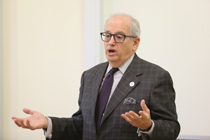Andrews Fellow stresses vigilance in the face of growing political unrest
The American government can have partisanship and still solve problems, but today’s political tribalism is a problem in itself, according to Norman J. Ornstein.
“You can be a partisan, meaning you believe in your own party in its own areas, but also have a fundamental respect for people on the other side. … But when you have tribalism, working with somebody on the other side is like sleeping with the enemy, and it makes it much, much tougher,” he told a government class at William & Mary Tuesday.
Ornstein, a national columnist and best-selling author, is the university’s 2017 Hunter B. Andrews Fellow in American Politics. He visited campus March 20-21 to meet with members of the campus and local communities. Along with several class visits, he had breakfast and lunch with students, faculty and staff and spoke with W&M Law School professors as well as students in the Election Law Program. Ornstein also presented a public lecture moderated by Government Professor John McGlennon in Blow Hall Tuesday night to an overflow crowd — the largest ever gathered for an Andrews Fellow presentation.
At that event, Ornstein, a contributing editor and columnist for National Journal and resident scholar of the American Enterprise Institute, implored the audience to be vigilant in calling out bad behavior in the government.
"Don't ever think that this country — as long as our system has endured, as much as we've been through with the Civil War, with all of the challenges — that we are inevitably and forever immune from coming apart at the seams,” he said.
In Assistant Professor of Government Jaime Settle’s Political Behavior class Tuesday morning, Ornstein discussed the history of partisanship in the country, beginning with the turmoil over the Vietnam War he saw when he first arrived in Washington, D.C., in 1969.
“What was interesting was that the divisions were not partisan ones,” he said, adding that some of President Richard Nixon’s most ardent supporters were Democrats.
When Nixon was impeached a few years later, politicians were sharply divided along partisan lines, Ornstein said, but after a series of hearings, the two parties came together around the center. However, several factors soon moved the parties apart.
 “The parties became more coherent and cohesive ideologically and a little bit more like parliamentary parties and all of that accelerated as we moved through the 80s and 90s and beyond, and the center gradually disappeared,” he said.
“The parties became more coherent and cohesive ideologically and a little bit more like parliamentary parties and all of that accelerated as we moved through the 80s and 90s and beyond, and the center gradually disappeared,” he said.
But that process wasn’t completely a natural one related to changes in the country, Ornstein asserted. It was accelerated by Newt Gingrich’s strategy to regain Republican control of the House of Representatives by disparaging Washington politics in order to undermine the longtime Democratic incumbents’ credibility.
When Bill Clinton was elected to the presidency, Gingrich got the Republican Party to unite in opposing everything Clinton wanted to do, creating the sense that the government wasn’t working, Ornstein said. At the same time, the repeal of the Fairness Doctrine, which required broadcasters to present balanced coverage of controversial topics, led to the rise of highly partisan radio talk shows.
“[All of that] transformed our politics, and that transformation led to greater polarization,” said Ornstein. “The strategies that Newt used became a more permanent part of our political life, and now if you just fast-forward to Barack Obama, we saw an acceleration of that when he came in.”
Technological changes have also played a significant role in increased polarization and tribalism in the country, Ornstein said, by influencing how news is presented and consumed.
“We began to see these closed information loops that moved people further apart, away from sharing a common set of facts, and what we see now is that all of that has created an enormous challenge to governance,” he said.
“It’s a challenge because our political system is built on the idea that you can debate and deliberate and find either common ground or at least an understanding that the actions you are taking are legitimate because everybody has a chance to make their viewpoints known, that you start with a common set of facts and then debate, hammer and tong over what the solutions may be. If you lose that, it becomes much more difficult to govern, and it means that when you make decisions, large swaths of the country will see those decisions as illegitimate.”
When asked about solutions to the country’s growing polarization, Ornstein said that the good news is that America has made it through such divisiveness before.
“But of course the most vivid example of that is the Civil War and that’s not the way you want something like this to work through,” he said.















